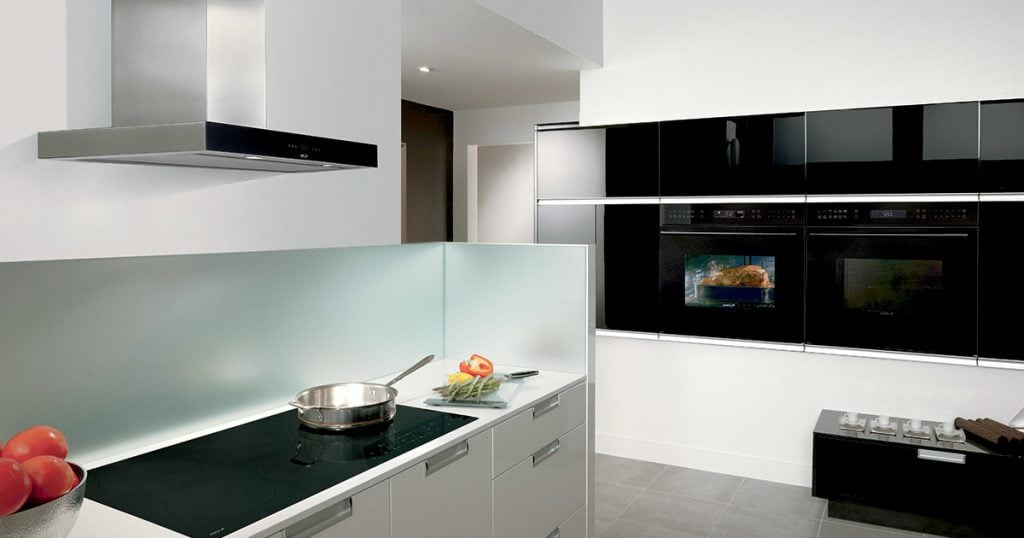What we wish smart appliances actually did.

More and more smart appliances are unveiled every year, but when we look at what makes them “smart,” it can be kind of a letdown.
“So what if I can preheat my oven on the drive home? Is that worth the higher price tag? Where’s the futuristic Jetsons kitchen I really want?”
It doesn’t help that there is no established definition of what make an appliance “smart.” The common characteristics are a connection to the Internet of Things and an integrated CPU to provide at least one helpful application—like preheating your oven from your phone. Nor does it help that appliance manufacturers are providing little information about their smart products.
Obviously, these next-gen appliances are still in their early evolution and should be given time to develop before being trashed as self-indulgent and unnecessary.
But sometimes it’s fun to be impatient and dream of what we wish they did, no matter how unreasonable our desires (though we don’t feel we’re being too unreasonable with the following ideas).
Washer / Dryer
LG had a smart washer with some interesting features:
- Allow you to download and set custom wash cycles for precise treatment of certain stains or clothes
- Sense the size of the load to fill the tub with the proper amount of water
- Maintenance alerts to tell you when to clean the tub and remote troubleshooting to help when the machines break down (our techs don’t need any help with troubleshooting, but we can see why consumers would like the peace of mind)
And one baffling feature:
- Remote cycle start for people who have a phobia of running washing machines while they’re in the house
The operative word being had, as that washer has been discontinued and a cursory search hasn’t revealed any other washers emerging to take its place.
So we’re left dreaming:
Timers
Unless the manufacturers are being very coy, the one feature we want and can’t believe they don’t offer are cycle timers. Imagine being able to start the cycle and wander off to the opposite side of the house, but know the exact moment the cycle is over thanks to an alert on your phone (followed by occasional reminders until the washer is emptied). No more forgotten loads! Also, if you’re washing multiple loads and the washer finishes before the dryer, you would then know how long you have before the dryer finishes.
Automatic Detergent
We love the sensor for determining water level, but we want more. Combine that information with sensors to determine the weight of the clothes and the machine could automatically calculate the amount of detergent needed for that load. Most people use too much detergent when washing their clothes, which causes many problems; this would put an end to oversudsing.
But why stop there? Include a built-in detergent reservoir and dispenser, one that jets out the calculated amount of detergent after the machine starts.
Even better, thanks to the integrated CPU, the dispenser will learn how often you wash loads and how much detergent your loads require, to calculate the rate of use. When it senses the detergent reservoir getting low, it can automatically reorder your preferred detergent to arrive before it runs out (based on the learned rate of usage).
We’ll take our Nobel prize now, thank you.
What About the Dryer?
Dryers are already quite intelligent. Many have moisture sensors that sense when clothes are dry and end the cycle, either saving energy when the drying cycle is longer than needed, or automatically extending the cycle for that comforter that never dries in just one cycle. This tech has been around since the 60s. Many dryers also have temperature sensors which shut off the heat when the drum gets warm, thereby preventing clothes from overheating and being damaged (and reengage the heat when the temperature becomes too cool).
What more could you ask from a dryer? Automatic lint-filter cleaning? Robot arms to fold your clothes?
Ovens / Ranges
We’ve already maligned the preheating-by-phone feature as not nearly worth our money. And there are some smart cooktop ovens that offer cool features like integrated temperature probes that sense when meat is cooked and shut off.
But of conventional ovens and ranges, there is little to choose from, apart from the Dacor smart ovens which, while offering the integrated temperature probe and ability to set temperature and cook times from your phone, still doesn’t cover all the bases.
Prep Time Estimates
If you’re handling complicated, multi-step recipes, it can prove difficult to juggle how long each step will take. An oven/range that takes some of the guesswork out by letting you know how long it will take to preheat to the correct temperature, or how long before a pot of water weighing so much is boiling, would be a welcome addition to any kitchen. It doesn’t need to be super precise, merely close enough that you don’t either waste energy or find yourself twiddling your fingers.
Integration with Smart Pots and Attachments
“Bring to a boil then reduce to a simmer, stirring occasionally, for 10 minutes.” It’s a common enough cooking instruction. Imagine a cooktop whose CPU can read and interpret uploaded recipes, that can integrate with smart pots or pot attachments to sense when the food is boiling and automatically reduce the temperature to a simmer, can automatically set the 10-minute timer, and whose integrated pot-stirring attachment will then activate at occasional intervals.
This, this is Jetsons-worthy.
Timers
Again, are these ovens merely being coy? Why not advertise the ability to see how much time is left on your timers and when they go off? Yeah, it’s stupid simple. But its value sells itself.
Refrigerators
This is the one appliance where manufacturers have some real imagination, coming up with some cool improvements for your fridge, including ones that benefit the whole kitchen, not just the storage of food.
All we have to add to this conversation comes from our refrigerator repair and maintenance headspace:
Maintenance
Many fridges contain water and air filters to keep water safe and food from spoiling. We would love to see maintenance alerts like those on that discontinued LG washer. A fridge that can also sense when its condenser needs to be cleaned would be even better.
Troubleshooting Alerts
When refrigerators break down, internal temperatures rise and food spoils. The fear is that, if you don’t catch the temperature changes in time, a lot of food will spoil. Which is why we would love to see “high temperature” warnings sent to phones, to alert homeowners to the issue so they can get it fixed before anything spoils.
Conclusion
This exercise proved harder than we thought.
- It’s surprisingly hard to find information not only about what smart appliances are available, but what all those smart appliances do.
- It wasn’t always obvious what improvements could be made. Case in point, we couldn’t think of much to add to a dishwasher to make it both smart and valuable.
If you can think of any improvements for dishwashers, or other appliances, that we didn’t think of, feel free to share.









